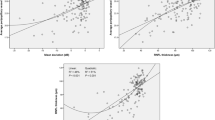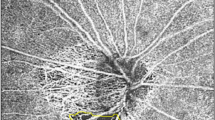Abstract
RECENTLY, a nodular dystrophy of the inner layers of the trabecular meshwork (pectinate ligament) has been described in a normotensive eye containing a small malignant melanoma. The dystrophy consisted of fusiform, annular and nodular expansions of individual trabecular fibres and it was suggested that an elevation of intraocular pressure could result from a progression of these changes throughout the meshwork1,2.
This is a preview of subscription content, access via your institution
Access options
Subscribe to this journal
Receive 51 print issues and online access
$199.00 per year
only $3.90 per issue
Buy this article
- Purchase on Springer Link
- Instant access to full article PDF
Prices may be subject to local taxes which are calculated during checkout
Similar content being viewed by others
References
Speakman, J. S., Brit. J. Ophth. (in the press).
Speakman, J. S., Canad. Med. J., 84, 1066 (1961).
Garron, L. K., Trans. Fourth Conf. Josiah Macy Jr. Found., New York, edit. by Newell, F. W., 231 (1960).
Leeson, T. S., and Speakman, J. S., Acta Anat. (in the press).
Author information
Authors and Affiliations
Rights and permissions
About this article
Cite this article
LEESON, T., SPEAKMAN, J. Pathogenesis of Raised Intraocular Pressure in Chronic Simple Glaucoma. Nature 193, 694–695 (1962). https://doi.org/10.1038/193694a0
Issue Date:
DOI: https://doi.org/10.1038/193694a0
Comments
By submitting a comment you agree to abide by our Terms and Community Guidelines. If you find something abusive or that does not comply with our terms or guidelines please flag it as inappropriate.



